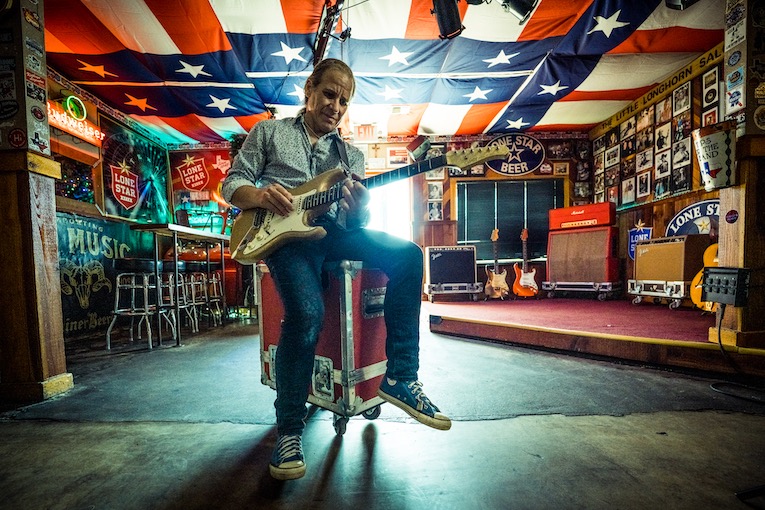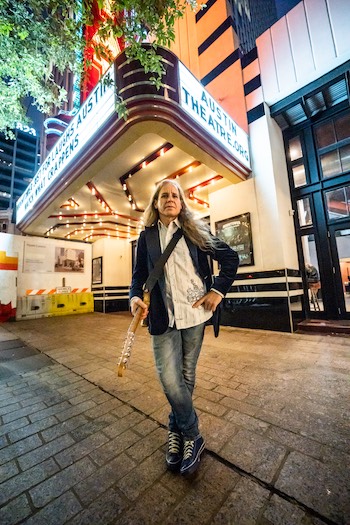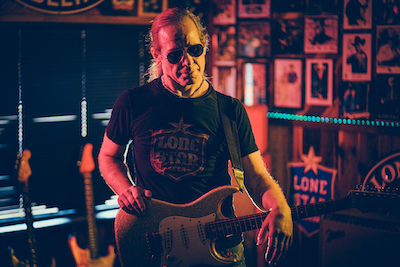
Photo: Chris Duarte by Jim Arbogast
By Martine Ehrenclou
Texas blues guitar slinger Chris Duarte works his magic on his new album Ain’t Giving Up, reuniting with producer guitarist Dennis Herring from Duarte’s 1994 Texas Sugar Strat Magik album. The new record was recorded live on the floor and it’s raw, gritty rock and roll. A high energy affair, Ain’t Giving Up captures the guitar virtuoso’s mastery of the Texas shuffle, and his deep love for the blues infused with rock and roll. The album drops April 14th via Provogue Records.
Known for his aggressive, passionate playing style, tough enough to draw blood from his fingertips, Chris Duarte takes charge of the Texas blues tradition, not unlike Stevie Ray Vaughan. In fact, he’s been recognized as a modern blues version of SRV. A student of several genres, Duarte kicks down the doors of the blues by infusing punk, jazz, rock and funk. A wildly talented guitarist, he lets loose in a way that many don’t. He won “Best Blues Guitarist” in Guitar Player’s Reader’s Poll, has released 16 albums and toured the world several times over.
Whether billed as Chris Duarte or Chis Duarte Group, this singer, songwriter guitar player tours more than 150 dates a year. He’s headlined major festivals and clubs throughout the US, Europe and Canada and performed with Julie Burrell, Diana Cantu, Bobby Mack, Tracy Conover, Indigenous, Omar & the Howlers, and the Americana band Beth Lee & The Breakups. His concerts dates in North Carolina and South Carolina were filmed for the PBS television show, The PBS Project.
Talking with Chris from his home in Texas, he shared his thinking about his new album Ain’t Giving Up .
“I knew I wanted it to be a blues album, but I still wanted to have some unmistakably Chris Duarte-style stuff. I love blues, blues is in my wheelhouse, but there’s the certain Chris-isms that I put–I just go crazy because (John) Coltrane’s my top guy and I try to emulate the spiritual, but yet with these sheets of sound sort of thing going. I wanted to do a Chris Duarte album, but I wanted to get back to playing blues and just make a really simple album. I think that’s why I got Brannen Temple again on the drums, who was also on Texas Sugar. And then Jessica Will, who is a bass player that I met through Beth. She’s extremely solid, extremely simple, and that’s what I wanted. She doesn’t overthink parts. I know a lot of guys, it’s not the ego thing, but they just want to flex their stuff. They want to show how much they can do on their instrument, and I didn’t want that. I just wanted somebody that can hold it down real basic. And that’s what Jessica’s just supremely good at.
When you say the ‘Chris Duarte sound’, do you mean songs like “Big Fight” or “Can Opener” off your new album?
“That’s a good one,” Chris said. “‘Can Opener’, yeah that’s definitely Chris Duarte because of the shuffles and the swinging and the blues.”
How much of an influence was Stevie Ray Vaughan?
“Oh, yeah. Stevie was a huge influence,” Chris said. “I’d seen him a couple of times in the clubs before he was famous here in Austin. I could have kicked myself, I could have seen him literally dozens and dozens of times before he made it because he was playing every Thursday at the Continental, every Tuesday at the Rome Inn. He was all over town. I was fortunate enough to see him a couple of times in the clubs. Just the sheer force of him, just seeing him in a small place and just how he just rips it. Stevie, just the way he did his tones, the way he thought about changing his pickups. I try to do the same thing. Guitar nerds always ask me, ‘What’s your favorite pickup on the guitar?’ Because I play a Strat and you have five variations to work with, it just depends what’s going on in the song right now. Because I switch around on the tones, and that’s what I love about Stevie, switching the tones and just the way the ferocity that he attacks the music.”
You said that you planted your flag with your Texas Sugar/Strat Magic album and on this new album Ain’t Done Yet that you’re pushing the music forward. Can you elaborate?
Chris said, “A lot of people might have thought I was sort of slipping away into obscurity because I haven’t had an album out for a while. But anybody that knows me still sees me out there playing. I’ve still been out there. But when it comes to still making a statement in music, I’ve always said, ‘Music must evolve to survive.’ It’s got to keep moving. There’s nothing wrong with the old traditional songs, but if we’re going to have music grow and mature, it’s got to evolve and it’s got to have different influences in it. That’s what I’ve always been for.
I love trying to stretch the boundaries, or push them out of what blues can do. And like I said, there’s nothing wrong with trying to play real traditional sounding funky stuff and using old vintage equipment, nothing wrong with that. That’s cool. I think GA-20 is doing a great job. I just listened to some of their stuff last night. Really great sound. They’re doing all that stuff. It’s the Hound Dog Taylor approach and the little quirky arrangements. I love it. It’s sounding great. But I want to put in some of the newer influences that are coming on, and I wanted to push it into the 21st century.”

Photo: Chris Duarte by Jim Arbogast
When you say that music has to evolve, how does your music evolve?
Duarte said, “I don’t know what these songs are going to sound like five years from now after me playing them night after night and I just can’t play a song the exact same way every single night, it’s going to eventually change and evolve and move on. That’s what’s happened to all my songs over the years. And I change as a player because I’m still practicing. I’m still trying to look for a way to go from A to B and trying to find new musical paths. Fortunately, I have these gigs right now in Austin where I kind of fly under the radar and they’re gigs where I can play anything I want. So, a lot of the time I’m just working on musical ideas on these shows.”
What do you think causes your music to evolve? Is it experimenting on your own, collaborating with others or is it listening to others’ music?
“I think you hit it right there: listening to other music because that helps you get fresher ideas and helps you think of new approaches to things,” Chris said. “I don’t have this endless well inside me, but I think it does take experimentation working with stuff because you try some things, you think it’s going to work out and it’s like, oh, that really didn’t work out so well. And you just keep working at it and get it from that really dry pedantic sound to where it starts sounding passionate and it starts making its own musical statement. And that’s what I try to do.”
Your guitar solos are edgy, ripping. What is it about not playing it safe that appeals to you? What does that feel like?
Chris shared, “Playing not safe is not doing the same thing over and over and over again. I learned after thinking when I first went from the clubs to bigger venues that I just can’t go out there and do my club show. I’ve got to have a show together. So, I have to tell stories, I have to put the solos as stories. And so some of the stories are going to sound the same. They’re not quite exactly the same. But playing like I’m in a cover band where you play a part and you play that same part over and over, that’s something I could not do. And that’s what I think is playing safe: just playing over patterns.
The only time I have to resort to playing patterns is when I truly can’t hear myself and I can’t get inspired with the music and I just have to play it safe and trust that it sounds good because I’m just playing these safe patterns that I know will go okay in the songs.
But on the magical nights, those are the ones where I’m thinking of ideas and they come out, there’s a connection between my brain and my left hand that comes out. I just can’t describe it because the way my world runs when I’m playing on a gig–I am two to three seconds in front of everything that’s going on. I can hear what’s coming in two or three seconds. So that’s how I play.
So, as you’re playing, your hands are working the magic and you’re already thinking ahead about where it’s going to go. And yet you’re still in the moment, obviously.
“Right,” Chris said. “Exactly, that’s how I think. Yeah, I’m obviously in the moment. I’m feeling it. I’m doing it. I’m feeling when I know how that’s going to feel when I hit that note and that passage and stuff. But still, my brain is thinking two or three seconds what I’m going to do after that.”
What do you love most about playing live? You tour a lot.
“What I love about touring live is seeing all the people, moving people emotionally when they come see me,” Chris said. “A lot of people follow me. When I’m in a certain area and there’s like four or five shows, they’ll follow me like the Grateful Dead because they know that I am not going to play the same gig twice. That’s what they love. It’s like, ‘I got to go to his next gig because I don’t know what he’s going to play. I can really miss out on something.’ I’ve got one woman that’s seen me over 500 times and she’s been to almost all the states, including Hawaii. And I know if I get to Alaska, she’s going to go to that gig just to mark it. She’s pretty much been to the whole contiguous United States and Hawaii.”
Some of your songs have a real rock and roll vibe. A couple almost fifties or sixties, is that correct?
“Yes. Like that song ‘Bye Bye Bye’,” Chris shared. “Just the way I swing with it because Brandon’s laying down that kick, kick, kick, kick, kick, kick. And it just makes me want to swing with it and be like the old rockabilly guys. And then I get this sort of percussive thing going on my rhythm. Yeah, I’ve loved doing that stuff. That’s the mark I think I’ve really made on music, not my interval choice in solos but my passion, how I throw it in solos or my Coltrane influence. I think it is my rhythmic style that I’ve got during playing rhythm and using those rhythm things in solos. I think that’s the mark I’ve really made on music.”
Where did that rock and roll vibe come from?
“I think it’s from listening to all the old masters because you just can’t get that tone anymore,” Chris said. “And just the way it came out of the studio using those old vintage stuff and just the way it sounds. You hear some of those old Sun sessions, even the Nashville guys back in the old days from the fifties, the traditional countries, Hank Williams and Bob Wills and stuff, just the way they swung so hard with the music. I think that’s what I’m trying to be like, from the fifties guys. And then all the old masters, Gene Vincent, the old rockabilly masters, Carl Perkins, all those cats, I love it, Duane Eddy.”
I also really liked your song “Weak Days.” Is B.B. King an influence for you?
Chris said, “Oh, big influence, man. I love B.B. King. I used to listen to this one live album that he had called Blues Is King that’s from this live show from ’67 or ’68 in Chicago. His phrasing and his note choice is just so on top of it. And I love it. And I’ve copied so many of those licks back in the old days when you’d have to lift the needle off the record and keep putting it on. B.B. is just a huge wealth of material to mine from. Even his old stuff, the old King Records stuff way back in the days. But yeah, B.B.’s a huge influence because he could do some really furious stuff, but yet he could just do, when he just plays just those few notes, they’re just so well-placed and it’s just, there’s a reason he’s the King.”

Photo: Chris Duarte by Jim Arbogast
Tell me about your guitars. Do you stick to a Strat?
“I tend to gravitate towards the jazz boxes, the big old jazz guitars. I love the way they feel, the way they sound,” Chris said. “But when it comes to the Chris Duarte Group, the Strat is my weapon of choice because that’s what I’ve been playing with the whole career, and I’ve got five tones to mess with. I love the Les Paul, and I think Joe Bonamassa has done a lot to bring the Les Pauls back. I noticed a lot of people are playing Les Pauls again. And I used to play Les Pauls for certain songs that required that tone because to me, Les Pauls just have this one tone. But give me a Strat any day because you’ve got, like I said, five tones you can mess with. And if you have a whammy bar, you can sort of mess with that. There’s a lot of tricks you can do with the Stratocaster.”
Do you have a number one guitar?
“Yeah, a 1963 Strat. I still got her. I played her right into retirement.” Chris continued. “Xotic stepped forward to make me a guitar and I told them they really need to replicate the neck because I didn’t want my hand to get used to a different neck. And so that’s what they did. I play a gold sparkle. It’s pretty much the Chris Duarte model. I want to say it’s the XJ-2 or JX-2. I’m so bad with model numbers. It’s a gold sparkle Strat that Xotic makes, and the headstock is the same color. I always tell them that: make the headstocks the same color.”
What’s coming up for you?
“I’ve always said when the album comes out, that’s when the work really starts,” Chris said. “So I’m just looking forward to getting out and working the album, getting it out. I want it to grow some legs underneath it because I’m not getting any younger. I just want to pad my nest egg just a little bit because you never know what can happen. I’m blessed with the good health that I have, but I could wake up one day and all that could be taken away from me. I just want to still get out there and meet the people, move them, because that’s what really gets me going.
I just want to get out and still do my thing while I can. I really think I’ve been lucky my whole life that I’ve been able to play my music, doing my thing for the past almost 30 years. Even though times get a little hard, my bank account gets a little low, but still, I get to wake up and do my thing every day and I love it. And I couldn’t have imagined having a life like this 30 years ago.
I never imagined that my life would’ve been this blessed. Would I like to have a fat bank account? Yeah. Would I like to have a huge house and stuff like that? Yeah, sure. But mentally, I’m happy. I’m happy because I’ve been living my dream for a long time and I’m still doing it. A lot of cats I’ve seen that I thought would have a promising career have dropped off and they’ve gone off to do something else. And they’re happy doing that something else, but this is what I’ve always wanted to do, and I’m still doing it. And I’m making a mark on music at the same time, which is what I personally wanted to do. My legacy. I think it will live after me. I don’t know how long, but I think I’ll be talked about for a little bit afterwards, after I shuffle off this mortal coil.” Chris paused and said, “There’s your Shakespeare for you.”
For more information on Chris Duarte see his website
“Nobody But You”

Leave A Comment